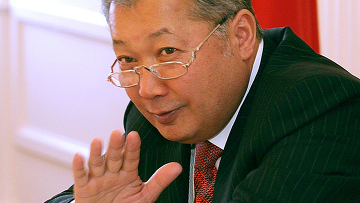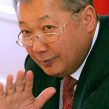
Bakiyev Promotes his Son to Key Post
Publication: Eurasia Daily Monitor Volume: 6 Issue: 204
By:

On October 29, Kyrgyz President Kurmanbek Bakiyev’s son Maksim Bakiyev was promoted to lead the Central Agency on Development, Investment, and Innovation (www.akipress.kg, October 29). The agency was formed as a result of Bakiyev’s recent government reform and is entitled to control all foreign financial inflows, including aid and credits. The agency’s responsibility also includes the control of major national hydroelectric and gold companies.
The president’s decision to promote his son to an important post resembles other Central Asian presidents’ wish to extend their family rule and, possibly, create a successor from among its members. In Tajikistan, for instance, President Emomali Rakhmon’s son Rustami was elected as the deputy head of the Youth Union and mooted as a potential successor in 2020 (EDM, August 20). As Kyrgyz political activist Edil Baisalov noted: “The Bakiyev [family] is planning a dynastic succession. But today this [promotion] signifies a long-term ‘program’” (www.baisalov.livejournal.com, October 29). Baisalov argues that Maksim made key decisions when a new government was formed last week. As part of his latest government reform, the president decreased the number of ministries and parliamentary structures (www.akpress.kg, October 28).
The leader of the opposition party Ata Meken, Omurbek Tekebayev, described the recent changes in the government and parliament as Bakiyev’s “privatization” of the state (www.parus.kg, October 28). From U.S. assistance to Russian credit –all finances will now be in the hands of the president’s son, Tekebayev commented. “This way, a parallel budget is created in the country –the parliament and government will not be able to oversee it”, the leader concluded.
In the past year Bakiyev has transformed the National Security Service into a powerful special service agency with extended authority over public life. The president’s brother Zhanysh and another son Marat, both heads of security structures, ensure that the regime is protected from the police level to national army and intelligence structures. However, both relatives are not as powerful as Maksim when it comes to managing the country’s financial and cadre politics.
Maksim is in his early thirties and is one of the country’s wealthiest entrepreneurs. He will be qualified to run for president after Bakiyev’s second term expires in 2014. Maksim began his modest entrepreneurial activity when Bakiyev served in various government posts during the reign of the former President Askar Akayev. However, his career was significantly advanced after Bakiyev came to power on March 24, 2005, as a result of mass protests against Akayev. At that point, Maksim helped his father finance his campaign by covering some costs such as distributing cell phones to Bakiyev’s staff members. Since then, reportedly, Maksim quickly gained informal control over all major national enterprises, including water and hydroelectricity management. Before becoming head of the agency, Maksim had already benefited from revenues collected on Manas, where the U.S. transit base is located.
Meanwhile, it remains unclear how Russia’s $2 billion credit, of which roughly one-fourth has already been allocated to Kyrgyzstan, will be spent. Initially, the credit was intended for the construction of the Kambarata-1 hydropower station, but the whole process of credit spending is opaque. Today, the Kyrgyz hydroelectricity and thermal electricity production facilities can barely meet the requirements of the local market. The government has already started rationing electricity and water supplies as of October 1. Conveniently, Bakiyev blames the global economic crisis for affecting the lives of the Kyrgyz (Nezavisimaya Gazeta, October 29).
With Maksim secure in his new post, doing business in Kyrgyzstan will become virtually impossible for those failing to comply with the regime’s rules. Bakiyev’s son has acquired the legal means for controlling entrepreneurs in Kyrgyzstan in addition to his already powerful informal influence. Local opposition leaders’ access to the business environment will be closely monitored. Finally, Maksim will be able to regulate the external financing of local NGO’s.
Maksim’s new position has made Kyrgyzstan’s political life more predictable. He will continue ascending the political ladder and become the regime’s domestic and foreign policy representative. But Akayav’s experience has shown that having family members participate in important decisions makes it difficult for the leader himself to maintain his control over the country. Loyalists flocked around Akayev and his wife, as well as his other family members, and created multiple camps within the state. Shortly before the collapse of the Akayev regime, it was no longer possible to identify who exactly among Akayev’s staff was ready to genuinely support the president. As a result, Akayev’s government disintegrated within a few hours on March 24, 2005. The next few years will show whether Bakiyev faces similar risks.




